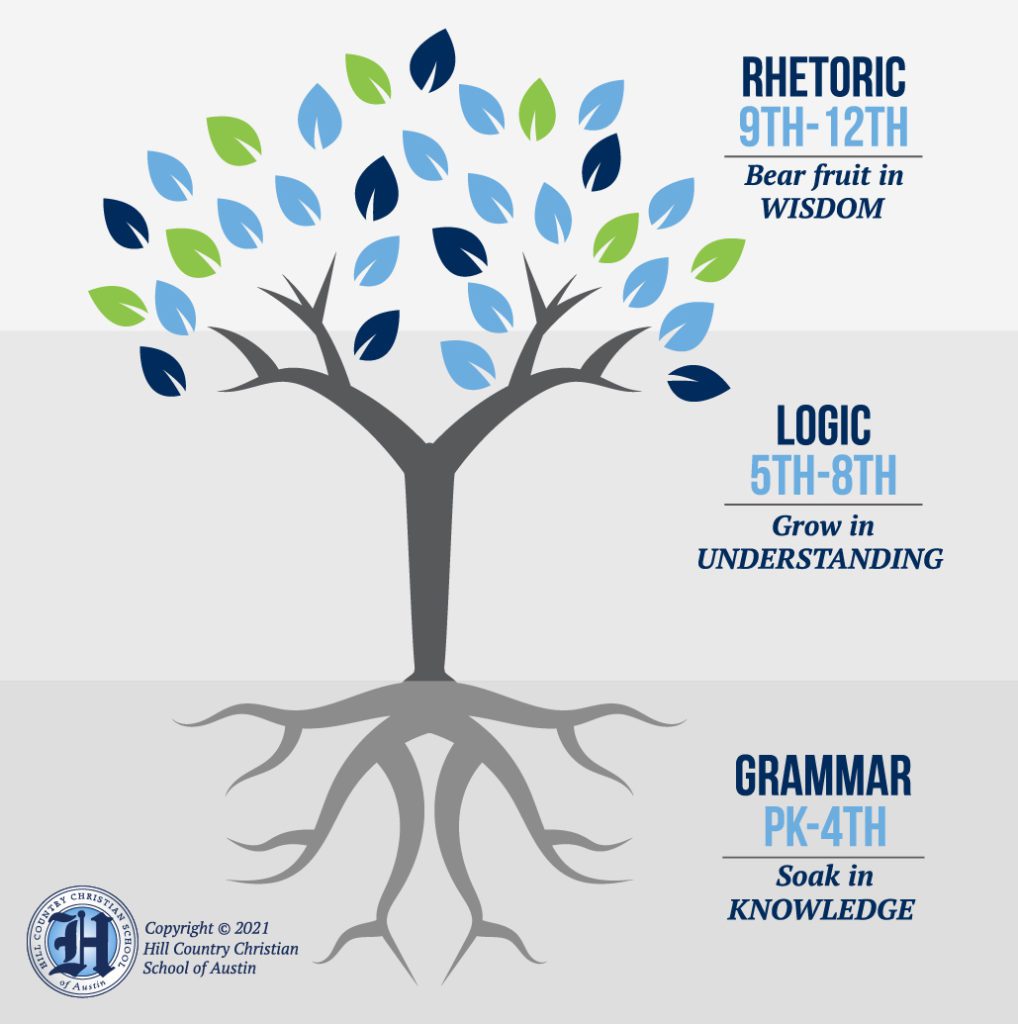Classical Education
Why is Classical Education Important?
Classical education is a time-tested approach that aligns instruction and curriculum to a child’s cognitive development and consists of three stages known as the Trivium, which creates a progression of learning from knowledge to understanding to wisdom. Curriculum and biblical worldview are integrated across subject areas so that students develop depth of knowledge and wisdom. We partner with Christian families to impart truth, cultivate character, and inspire service while preparing college-bound students to think logically, communicate effectively, and impact the world with the love of Christ.
| TRIVIUM STAGE | GRADES | ACADEMIC FOCUS | BIBLICAL CORRESPONDENT |
|---|---|---|---|
| Grammar | PK-4 | Information Acquisition Foundational Skills | Knowledge |
| Logic | 5-8 | Comprehension Logic Critical Thinking | Understanding |
| Rhetoric | 9-12 | Application Effective Communication Reasoning | Wisdom |
Understanding Classical Education
Parents interested in learning more about the Classical methodology of education are encouraged to read Wisdom and Eloquence: A Christian Paradigm for Classical Learning by Robert Littlejohn and Charles T. Evans. The stages of the Trivium are as follows.

The Grammar Stage
The first years of schooling are the Grammar Stage, not because students spend the entire time studying English, but because these are the years in which the building blocks for all learning are laid. In the Grammar Stage, students enjoy memorizing and naturally absorb information. Therefore, during this period, education involves not just self-expression and self-discovery, but also the learning of facts. Students learn rules of phonics, spelling, and grammar; poems; the vocabulary of foreign languages; the stories of history and literature; descriptions of plants, animals, and the human body; the facts of mathematics—the list goes on.
The Logic Stage
The Logic Stage is a period when a student begins to pay attention to cause and effect, the relationships between different fields of knowledge, and the way facts fit together into a logical framework. Middle school students are less interested in discovering facts and more interested in thinking analytically and asking, “Why?” The student begins to apply Logic to all academic subjects. The Logic of writing, for example, includes paragraph construction and learning to support a thesis. The Logic of reading involves the criticism and analysis of texts, not simple absorption of information. The Logic of history demands that the student find out why the War of 1812 was fought rather than simply reading about the events. The Logic of science requires that the child learn the scientific method. The tools learned in the first two stages prepare a student for the Rhetoric Stage.
The Rhetoric Stage
The Rhetoric Stage builds upon the first two stages. Students have acquired the knowledge and skills necessary to arrange facts into arguments. At this point, the high school student learns to write and speak with force and originality. The student of Rhetoric applies the rules of Logic learned in middle school to the foundational information learned in the early grades and expresses conclusions in clear, powerful, and elegant language. Students research important themes and present these concepts in papers and speeches. They finish Hill Country well-prepared to be lifelong learners who influence the world for Christ.
A History of Classical Education
Classical studies is a branch of the humanities dealing with language, literature, history, art, and other aspects of the ancient Mediterranean world. The history of this education focuses particularly on Ancient Greece and Ancient Rome during the time known as classical antiquity, spanning roughly from the Ancient Greek Bronze Age in 1000 BC to the Late Antiquity circa 500 AD. The study of classics was the initial field in the humanities. The term “Classics” is also used to refer to the literature of the period. The Classical method was born in ancient Greece and Rome, was used throughout the Western world by the 16th century, and remained the norm until at least 1850. What was the reason for its widespread use? It worked. The world’s great authors, statesmen, scientists, and politicians were classically educated. For the last 50 years, conventional education has taken an experimental attitude – trying a new approach and then abandoning it when it fails. Meanwhile, in the 1940s, Dorothy Sayers advocated a return to Classical education and teaching students how to think. Her essay, “The Lost Tools of Learning,” and later, Doug Wilson’s book, Recovering the Lost Tools of Learning, started a movement among educators and parents to restore the Classical philosophy in Christian schools.
Instead of the latest fad, Classical education is a return to a system proven for more than 1,000 years. Classical education uses methods tailored to students’ developmental stages. As they participate in the great conversation with history’s wisest thinkers, students acquire more than college preparation or vocational skills; they prepare for their future as informed citizens, critically-thinking Christians with a biblical worldview, lifelong learners, and virtuous shapers of modern culture.
What is a Classical Christian Education?
In this video, numerous leading voices in Classical education explain what makes it different from secular education and how this learning method corresponds to God’s design for a child’s natural development. In addition, they provide the context and history behind the current state of secular education and how students in Classical Christian education learn more than just what to think – they learn how to think.